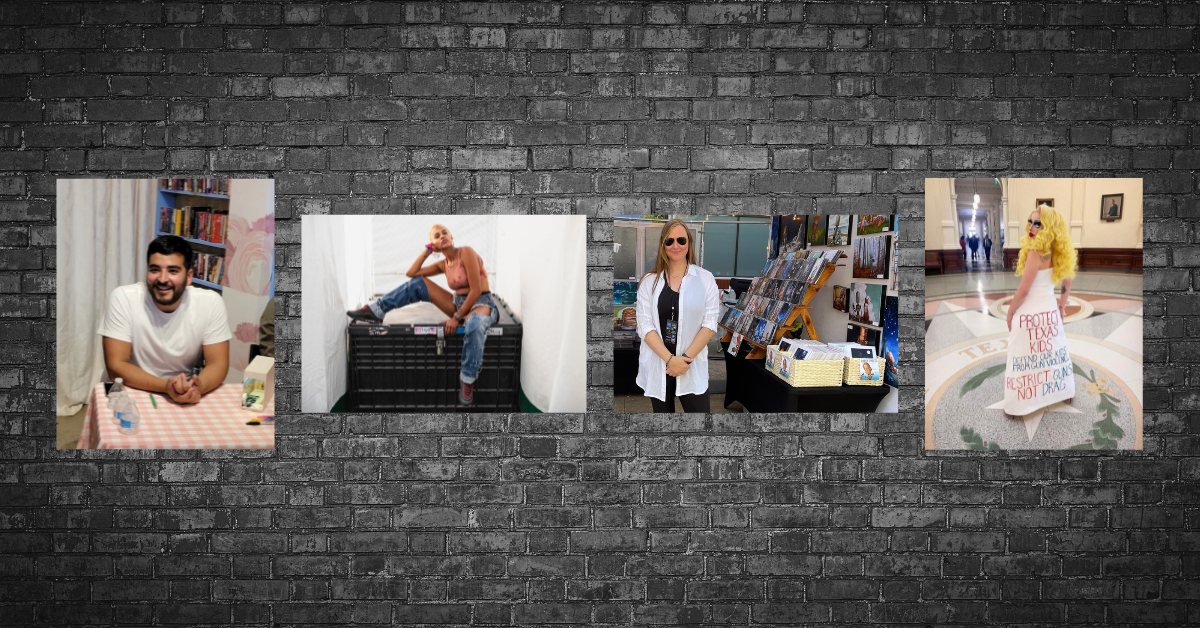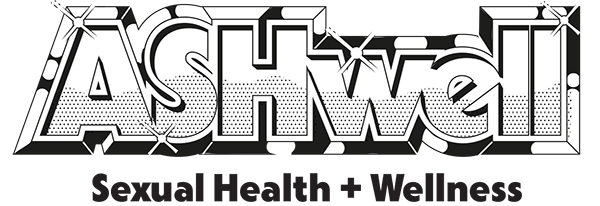Happy Austin Pride Month, cuties!
Before getting into all the exciting updates in this month’s blog, we’d like you to take a moment to shout out every one of you — our clients and funders, the community organizers and activists, and everyone who has persevered through a very tough year. Together, we will overcome these new challenges and barriers to accessing PrEP, gender-affirming care, and other sexual health and wellness services, and we’ll continue to stand against the relentless and baseless attacks on queer and trans Texans. No matter what they throw at us, know that ASHwell is here to support you in everything from sexual health and wellness goals to advocating in the halls of the Capitol.
As we begin the second Pride month of the summer, we thought of no better way to celebrate LGBTQIA+ central Texans than to highlight a few of the queer creatives that we’re proud to know and who inspire us by standing in the light and not letting any hateful attacks tear them down. We encourage you to check out the creatives below, share this blog and support them, and amplify the voices of these and other queer artists throughout Austin Pride Month and beyond.
Thank you for supporting Austin’s queer health. We’ll catch you at events all through August, so make sure to stop by our table to snag some condoms and dental dams, pick up some sexy stickers and merch, and learn more about ASHwell’s services.
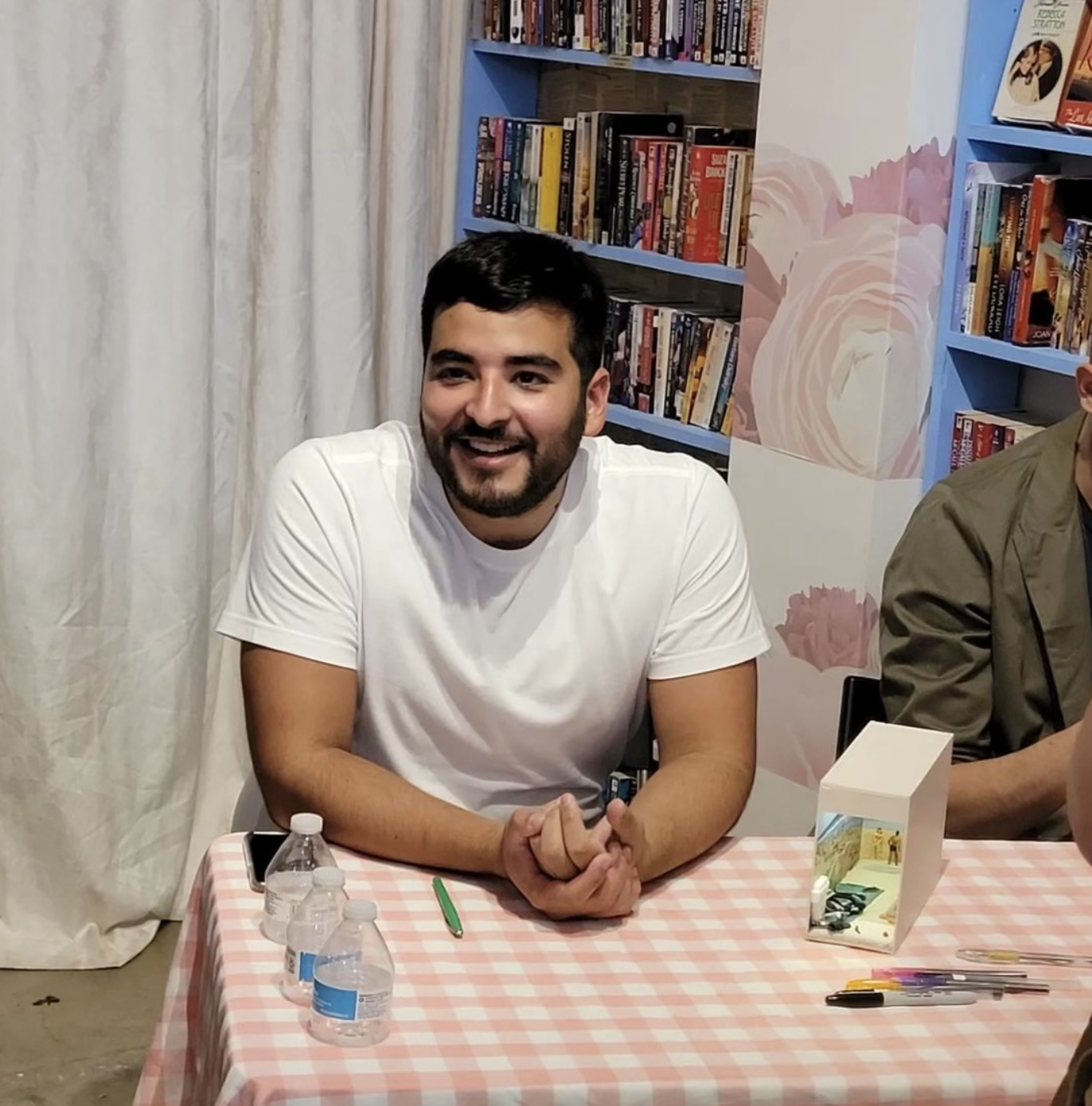
Aaron H. Aceves (he/him) is a bisexual, Mexican-American writer born and raised in East L.A. He graduated from Harvard College and received his MFA from Columbia University. His fiction has appeared in Epiphany, The Florida Review, and Passages North, among other places. He currently lives in Texas, where he serves as an Early Career Provost Fellow at UT Austin, and his debut young adult novel, This Is Why They Hate Us, was released by Simon & Schuster Books for Young Readers. It received multiple starred reviews and was named a Best Young Adult Book of 2022 by Kirkus Reviews.
Your book This is Why They Hate Us is centered around Enrique “Quique” Luna’s plan to get over one guy by getting under a bunch of others, but the reality of heartbreak and hookups aren’t always captured this well in young adult literature. Why was it important for you to portray a sex-positive character and story?
This is Why They Hate Us was recently challenged at a public library in Virginia, and I was able to find the request for reconsideration form that a “concerned parent” filled out for it. I found an addendum that featured (I’m not joking) ten pages of quotes from my book that they felt were inappropriate. Seeing those quotes stripped from context honestly had me doubting whether or not I was doing right by teenagers, but then I remembered two things. One, straight people have movies like American Pie and Superbad and while parents certainly disapprove of those stories, they don’t try to make sure no one has access to them. The second? Seventeen-year-old me would have benefited greatly from reading the book that twenty-four-year-old me wrote. He would have felt less alone, and his struggle to accept himself would have gone more smoothly.
What is your favorite memory of a queer story on the page and/or screen, and how did that impact you?
I remember reading Adam Silvera’s tragic and hilarious More Happy Than Not for the first time and thinking, There’s space in the industry for my books. I had already written my first novel, but meeting Silvera’s queer Latino protagonist (coincidentally also named Aaron) was much needed inspiration.
Between book bans and legislative attacks on queer and trans Texans, Austin Pride Month feels a bit different this year. Do you have any advice for LGBTQIA+ folx — particularly LGBTQIA+ young people — to hold onto their Pride and make it through this frustrating time?
There’s a line in TIWTHU that goes, “You can’t love someone if you’re not willing to fight for them,” and I think about that all the time. Anger is good. People who characterize standing up for oneself as ‘fighting fire with fire’ don’t realize that the sentiment virtually only benefits oppressors. Or they do and that’s what they want.
What is your favorite queer thing to do in Austin?
Perusing the LGBTQ+ section at BookPeople. Also, I’m a big fan of the Iron Bear. I haven’t sung karaoke there yet, but one day I will. One day.
You’re easily one of the most popular drag queens in Austin. What do you enjoy most about performing here?
I was born and raised here in Austin so I have personal history and connection with many of the spaces and places I get to perform. It’s important to protect what has historically made Austin so culturally progressive, especially in comparison to other Texas towns, and that obviously includes queer art and expression. In a time where it seems our city is becoming less and less focused on what brought people here in the first place, I enjoy continuing to make spaces for the queer community and existing outside cishet social norms and expectations that this city has always allowed for us.
What was the defining moment, memory, or inspiration that sparked your passion for drag?
I walked a ball the very first night I stepped out in drag. I had no idea what I was doing but I felt gorgeous and I suppose the fantasy was felt because I went home with a Best Dressed trophy! It was such an incredible and empowering moment for me. This came at a time in my life when I had lost a lot, including myself, due to an abusive relationship. Discovering myself again in that time and space was incredibly impactful. I never found the me that I had lost, but I’ve gotten to know myself in ways I never did or could before through drag. And that was just the beginning.
With your powerful voice echoing through Texas and beyond as the 88th Texas Legislature relentlessly attacked drag performers and queer and trans Texans, how have you grounded yourself amidst so much hate? What has helped you make it through such a difficult time for LGBTQIA+ folx?
I remind myself that we aren’t the first generation of queer people to face this kind of rhetoric. Our queer ancestors paved the way to where we are today and we must continue moving forward. We have so much strength in community and that includes where we’ve come from and those to come. I find a lot of hope and inspiration from reading and watching about our queer ancestors like Sylvia Rivera, Marsha P. Johnson, Stormé DeLarverie and Texas born drag icon Barbette. I have also worked to understand how oppressive systems like transphobia, racism, and misogyny (all of which we see in the bills proposed by this legislature) are interconnected after the loss of a close friend. Her name was America, and she would talk to me about the struggles she faced as a Black trans woman. When we protect our most marginalized communities, we protect all of us. I must do what I can do to create a world that would have been better for her, and I know she would have unapologetically told all the haters to fuck off. It is our community; those I know, have known, have gotten to know, and will get to know, that inspires me to keep fighting.
What is your favorite queer thing to do in Austin?
Go to drag shows, duh.
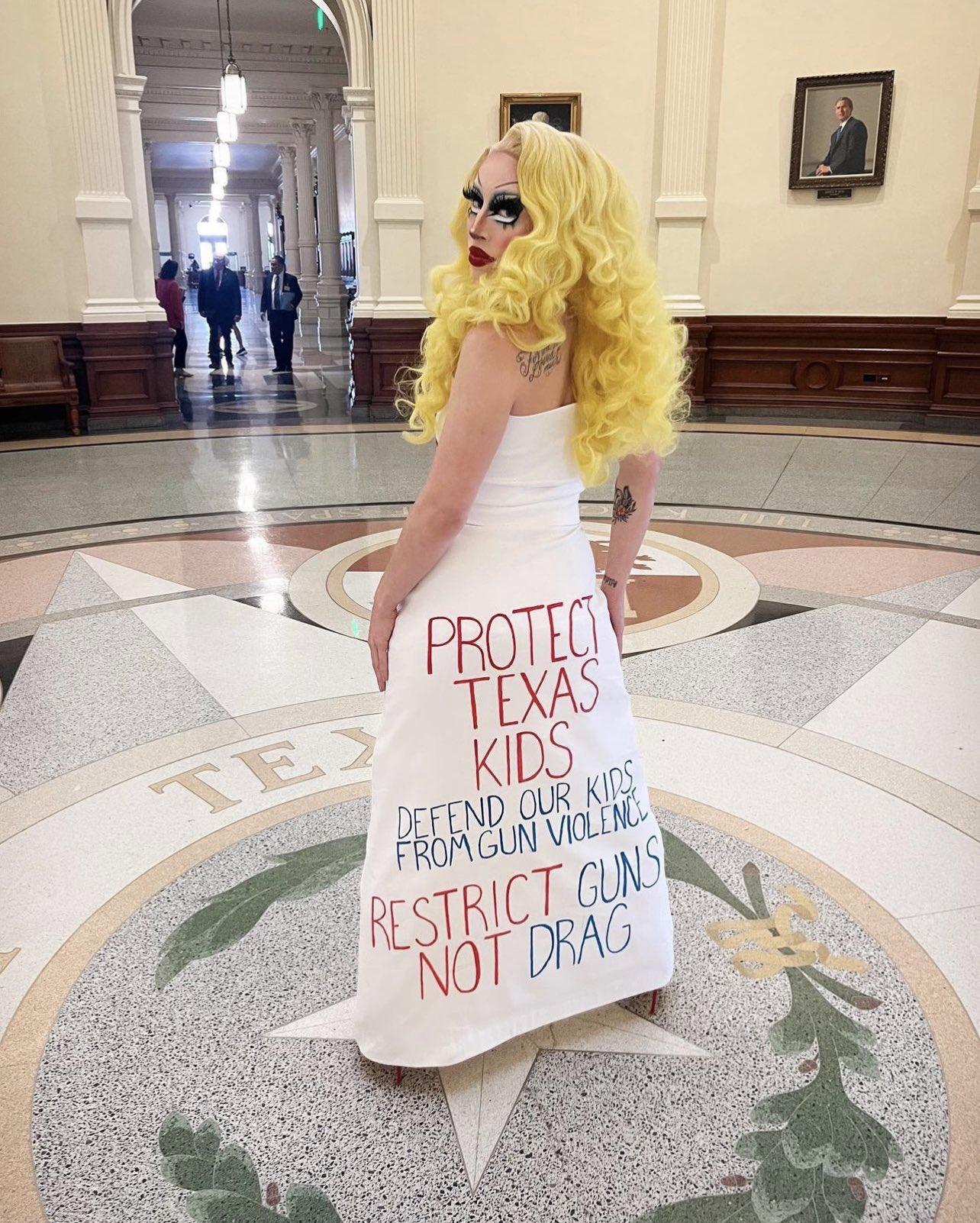
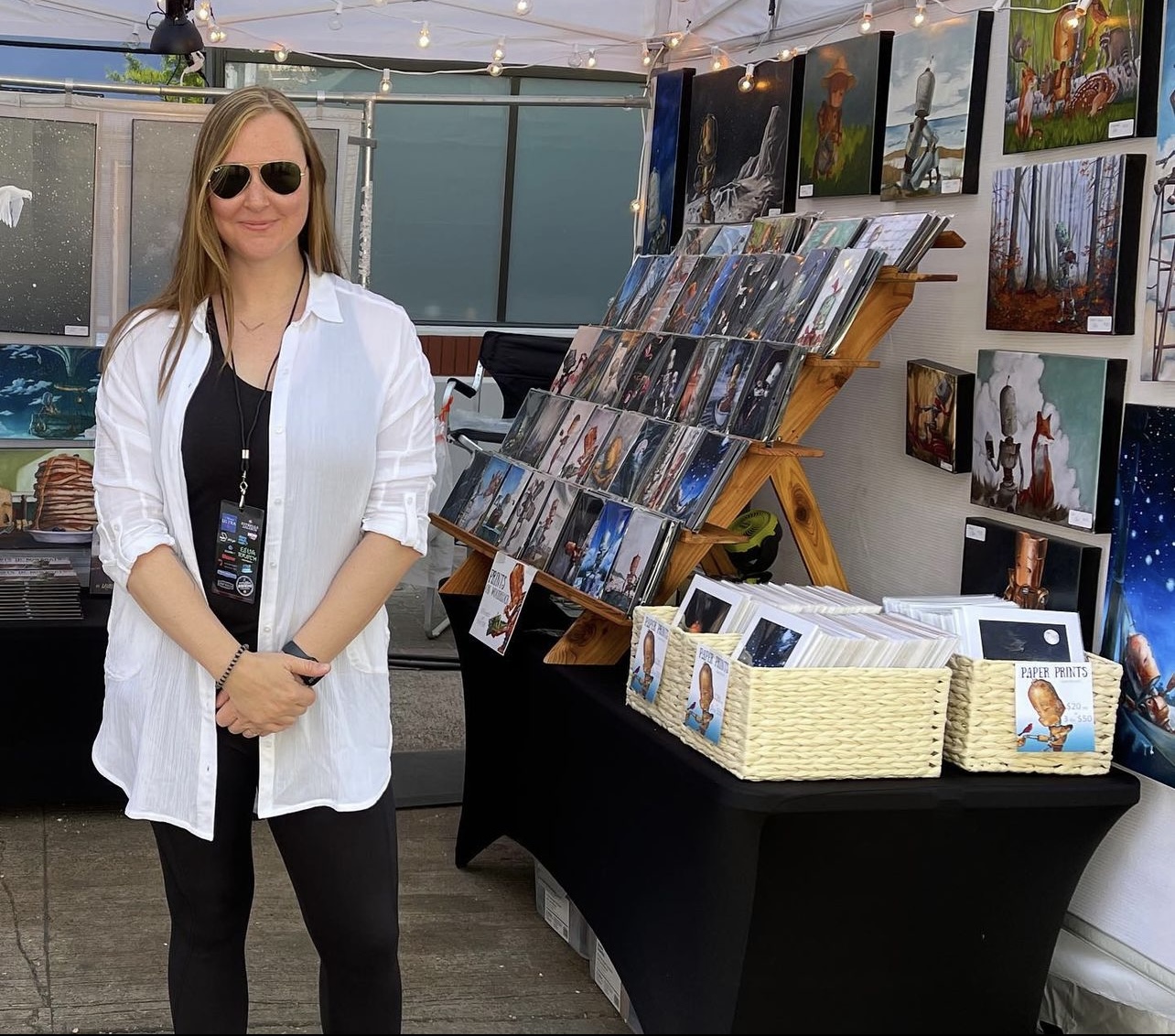
Lauren Briére, in her mid-30s, watches too many movies and eats popcorn as a meal more often than not. She grew up in Wrentham, MA and got her BFA in illustration from MassArt in Boston. She works in Austin, TX now and runs multiple projects from home. Her professional artist’s resume consists of work ranging from children’۪s book illustration, designer rain umbrellas “Over Our Heads”, animated music videos (two of which for the awesomely sweet band, The Weepies), and quirky painting series made for her own amusement. Robots. Lots and lots of robots.
As an artist most recently known for your Robots in Rowboats line of paintings and prints, did you expect the success and following you’ve garnered when you created your first piece with this theme? And why robots?
I absolutely did not expect it but I definitely hoped it would reach the masses and touch some hearts along the way. I’m very VERY lucky to have found a ‘thing.’ I came upon robots simply by enjoying the alliteration of a robot in a rowboat. The sound rolled off the tongue and I suddenly only wanted to paint bots sitting in boats as they interacted with the limited yet vast world around them. Over time I got brave and let them venture out beyond boats.
What is your favorite memory or defining moment that inspired you to become an artist?
Honestly, there were just many small defining moments growing up — I could just draw. I loved it and never once considered being anything else but an artist. I’m wicked lucky to have a supportive family that believed in me.
Do you have any advice on living authentically and holding onto creative passions for LGBTQIA+ people — particularly young LGBTQIA+ folx — who have withstood the relentless attacks on queer and trans Texans recently? For you, does your art serve as a sort of blissful escape from the often-dark times we’re living through?
The best advice I can give to anyone is to just do you. The biggest threat to “them” is that we simply exist. My response to that is that we don’t need them to understand us, they just need to accept that we f**king exist exactly as they do. Grocery shop. Go to the movies. Drive your car. For me, my art is a reminder that while different, we’re all very much the same. These bots are ageless, raceless, genderless…and yet they can do anything and go anywhere as they are. Isn’t that the goal for us all?
What is your favorite queer thing to do in Austin?
My wife.
Just kidding – I really enjoy going to drag brunches 🙂
As a rising star in the Austin music scene, what do you enjoy most about being an artist here?
That I can simply just be me, and that I’m giving that space to do so as well as share it with other creatives in such a fluid environment. The freedom of it all.
What is your favorite memory of queer representation on the page, in music, and/or on the screen, and how did that impact you?
My favorite moment would have to be watching Queen Latifah play Cleo in Set It Off. I don’t condone any crimes whatsoever (Disclaimer), but besides all that she was loud and proud of who she was, and who she loved, and her girlfriend. I really respected her and their relationship and found it to be so profound.
Austin Pride Month feels a bit different this year after relentless attacks on queer and trans Texans. Do you feel that your music and community help to distract from the darker parts of the world lately?
I would love to think that my music helps to distract, to be a heavy reminder. It’s unfortunate how much an unrestricted love can be so threatening to so many others but the show must go on and we must always prevail.
What is your favorite queer thing to do in Austin?
Well I wake up everyday and be the best MF I can be! I like what I like, I love who I love, and that’s the best thing.
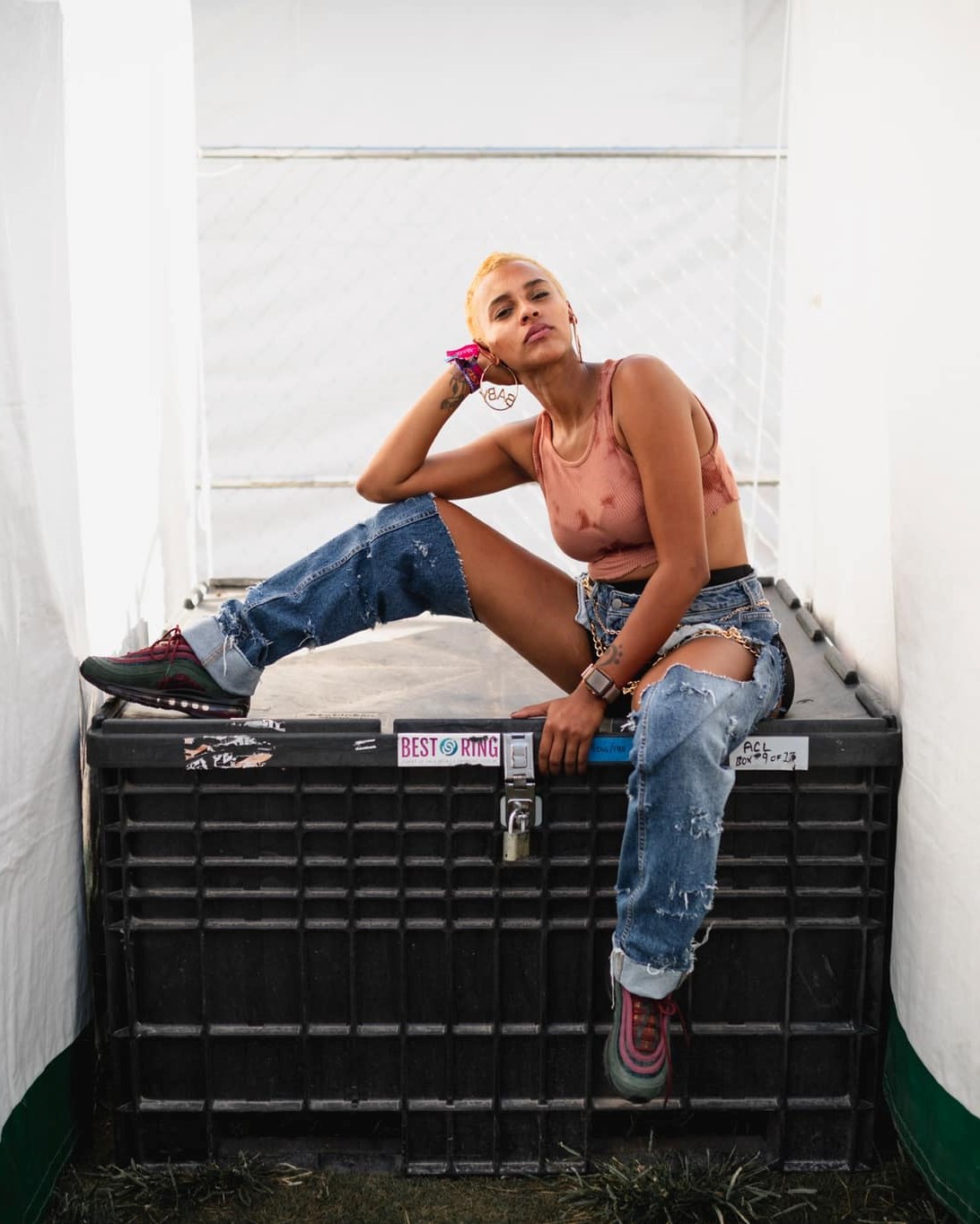
Alesia Lani, Austin’s own R&B/Soul singer & songwriter, is an award-winner with a resume that includes sharing stages with legends such as George Clinton, The Ohio Players, Guns N Roses, as well as heavy-hitters of today like Lizzo, Meg the Stallion, Childish Gambino, & Billie Eilish. She’s played festivals such as SXSW, Toronto’s Indie Week Fest, ACL 2019, and Jai Thep, as well as performing internationally touchign Thailand, Japan, Toronto, and more. The former model’s sultry, raspy vocals paired with a hip-hop twist give you the feeling that you may have found this generation’s Lauryn Hill or Erykah Badu, but with a distinct sound that is just as unique as it is powerful.
Alesia brings a blue-collar work ethic to her career and is known for delivering elite live performances made for primetime. The momentum continues to grow behind this starlet as she dazzles on her musical journey, especially with her recent signing to Los Angeles based label Trailing Twelve Records.
